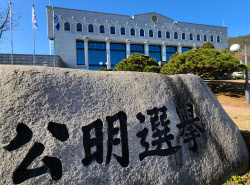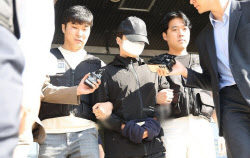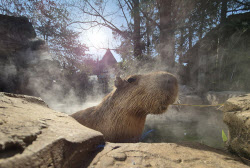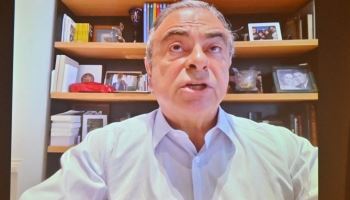2024년 12월 23일 월요일
[edaily 김진석기자]
Common Values, Principles and Strategy:
Joint Statement
between
President Roh Moo-hyun and President George W. Bush
On May 14, 2003, President Roh Moo-hyun of the Republic of Korea and President George W. Bush of the United States of America held a summit meeting at the White House in Washington, D.C. Noting that 2003 marks the fiftieth anniversary of the ROK-U.S. Mutual Defense Treaty, the two leaders pledged to work together to promote the values of democracy, human rights and market economy shared by the people of both nations and to build a comprehensive and dynamic alliance relationship for continued peace and prosperity on the Korean Peninsula and in Northeast Asia.
The ROK-U.S. Alliance
President Roh and President Bush welcomed the fiftieth anniversary of the ROK-U.S. alliance and paid tribute to those who have contributed to the alliance, particularly the Korean host communities and the members of U.S. Forces Korea (USFK) who have devoted themselves to the defense of peace and freedom on the Peninsula. President Bush reaffirmed the U.S. commitment to a robust forward presence on the Peninsula and in the Asia- Pacific region. The two leaders pledged to work closely together to modernize the ROK-U.S. alliance, taking advantage of technology to transform both nations’ forces and enhance their capabilities to meet emerging threats.
In the context of modernizing the alliance, the two leaders agreed to work out plans to consolidate U.S. forces around key hubs and to relocate the Yongsan garrison at an early date. President Bush pledged to consult closely with President Roh on the appropriate posture for USFK during the transition to a more capable and sustainable U.S. military presence on the peninsula. They shared the view that the relocation of U.S. bases north of the Han River should be pursued, taking careful account of the political, economic and security situation on the peninsula and in Northeast Asia. The two leaders also noted the opportunity provided by the Republic of Korea’s growing national strength to continue expanding the role of the ROK armed forces in defending the Korean Peninsula.
President Roh and President Bush welcomed the growing bilateral ROK.-U.S. cooperation on international security challenges beyond the Korean Peninsula. President Bush thanked President Roh for his support on Iraq and welcomed the Republic of Korea’s decision to deploy medical and construction units and undertake other efforts to assist with post-conflict humanitarian assistance and reconstruction in Iraq. President Roh expressed his support for U.S. and international efforts to establish lasting peace and security in the Middle East. The two leaders also reviewed progress and cooperation in the war on terror, noting the contribution of ROK forces to Operation Enduring Freedom and Afghan reconstruction.
To commemorate the fiftieth anniversary of the alliance, the two Presidents welcomed the convening of forums of experts to conduct discussions on the future of ROK-U.S. relations and to generate fresh ideas for both governments.
North Korea
President Roh and President Bush reaffirmed that they will not tolerate nuclear weapons in North Korea. They noted with serious concern North Korea’s statements about reprocessing, possession of nuclear weapons, and its threat to demonstrate or transfer these weapons. They stressed that escalatory moves by North Korea will only lead to its greater isolation and a more desperate situation in the North.
Both leaders reiterated their strong commitment to work for the complete, verifiable and irreversible elimination of North Korea’s nuclear weapons program through peaceful means based on international cooperation. They welcomed the role played by China at the April 23-25 trilateral talks in Beijing. They agreed that the Republic of Korea and Japan are essential for a successful and comprehensive settlement and that Russia and other nations can also play a constructive role in multilateral diplomacy. While noting that increased threats to peace and stability on the peninsula would require consideration of further steps, they expressed confidence that a peaceful resolution can be achieved.
Noting that the Republic of Korea and the United States are the two leading donors of humanitarian food assistance to North Korea, the two Presidents reaffirmed that humanitarian assistance is provided without linkage to political developments and noted the need to ensure that the assistance goes to those in need. President Bush stressed that North Korea’s nuclear programs stand in the way of the bold approach and the ability of the international community to consider comprehensive steps to assist the many needs of the North Korean people.
President Roh outlined his Peace and Prosperity Policy and President Bush reiterated his support for the process of South-North reconciliation. President Bush noted that the Republic of Korea has used this dialogue channel to call upon the North to resolve the nuclear issue. President Roh stated that future inter-Korean exchanges and cooperation will be conducted in light of developments on the North Korean nuclear issue. The two leaders reaffirmed their commitment to maintaining close coordination between the ROK and U.S. governments on this issue as well as in trilateral consultations with Japan.
Economic Relations
The two leaders agreed on the importance of working together to promote prosperity in their two countries, in the region, and around the world. They agreed that Korea"s economic fundamentals are strong and expressed high confidence in the prospects for continued increases in trade, investment and growth in the Republic of Korea. President Bush welcomed and supported President Roh"s commitment to continued structural reform of the Korean economy and his goal of making Korea a regional hub for trade, finance, and investment in Northeast Asia. The two leaders agreed that progress on open trade, investment, and transparency are essential to making this hub concept a reality, and recognized the important role of the private sector in this effort.
The two leaders expressed a desire for enhanced bilateral economic cooperation and reaffirmed their commitment to resolve bilateral trade issues through consultation, and agreed to explore ways to further strengthen the already close economic and trade partnership. Recognizing the importance of global trade liberalization, the two leaders expressed their determination to work together to achieve a successful conclusion of the Doha Development Agenda. The two leaders also agreed to strengthen cooperation in the APEC forum.
Toward a Full Partnership
Taking note of the one hundredth anniversary of Korean immigration to the United States, President Bush conveyed his deep respect not only for the contributions of Korean-Americans to American society but also for the ideals of democracy, peace and prosperity realized by the citizens of the Republic of Korea. President Roh extended his appreciation to the U.S. government and its people for all that has been done to help Korean-Americans realize their dreams in American society.
President Roh and President Bush highlighted the importance of increasing bilateral cooperation across a broad range of global issues. In this context, the two leaders welcomed ROK and U.S. cooperation in the International Thermonuclear Experimental Reactor (ITER) project, in the Global Forum on Corruption to be held in Seoul later this month, and on other efforts to improve the environment and combat crime and infectious diseases around the globe.
The two leaders agreed that their frequent telephone calls since President Roh’s election in December and their substantial discussion in Washington have built a personal foundation of mutual trust and respect that will enhance ROK-U.S coordination on North Korea and other challenges in the months and years ahead. President Roh thanked President Bush for his hospitality and invited him to make a return visit to Seoul at his convenience. President Bush said he looked forward to another visit to the Republic of Korea.
주요뉴스
저작권자 © 이데일리 - 무단전재, 재배포 금지
많이 본 뉴스
- 1 “하루 1000명 성관계 신기록 도전” 뒷이야기...1명당 41초
- 2 "남은 배터리 16%"…영하 10도 속 갇힌 등산객 구조[따전소]
- 3 尹·김건희 여사 때린 김부선 “이재명이 대통령 된다면…”
- 4 할머니에 욕정 품은 그놈…교회로 향한 이유는 [그해 오늘]
- 5 마은혁 헌법재판관 후보자 "계엄선포는 사법심사 대상"
- 6 ‘UFC 진출’ 유주상, “900원짜리 음료 못 사 먹던 시절 생각나” [인터뷰]
- 7 “아이유가...진심 슬펐다” 찐팬 국힘 박은식 섭섭함 토로
- 8 오를 이유만 남은 환율…'강달러'에 1500원대 턱밑
- 9 "검찰이 내 계좌를…" 유시민, 한동훈에 3000만원 배상 확정
- 10 삼성, 역대 가장 날씬한 ‘갤럭시 S’ 준비…‘초슬림폰’ 시장 겨냥
오늘의 주요 기사








![[포토]은행권 소상공인 금융지원 간담회](https://image.edaily.co.kr/images/Photo/files/NP/S/2024/12/PS24122300609t.jpg)
![[포토]인사청문회 출석한 마은혁 헌법재판관 후보자](https://image.edaily.co.kr/images/Photo/files/NP/S/2024/12/PS24122300404t.jpg)
![[포토]아침 영하 10도, 꽁꽁 얼어붙은 도심](https://image.edaily.co.kr/images/Photo/files/NP/S/2024/12/PS24122300843t.jpg)
![[포토]스케이트 타는 시민들로 북적](https://image.edaily.co.kr/images/Photo/files/NP/S/2024/12/PS24122200317t.jpg)
![[포토]기름값 10주째 올라…전국 휘발유 평균 1652.2원](https://image.edaily.co.kr/images/Photo/files/NP/S/2024/12/PS24122200258t.jpg)
![[포토]크리스마스 분위기](https://image.edaily.co.kr/images/Photo/files/NP/S/2024/12/PS24122200248t.jpg)
![[포토]'서울광장 스케이트장 좋아요'](https://image.edaily.co.kr/images/Photo/files/NP/S/2024/12/PS24122000768t.jpg)
![[포토] 나인퍼레이드 캠페인](https://image.edaily.co.kr/images/Photo/files/NP/S/2024/12/PS24122000496t.jpg)
![[포토]더불어민주당 최고위원회의 개최](https://image.edaily.co.kr/images/Photo/files/NP/S/2024/12/PS24122000232t.jpg)

![[포토]안소현-김성태 본부장,취약계증 후원금 전달식 진행](https://spnimage.edaily.co.kr/images/vision/files/NP/S/2024/12/PS24121400036h.jpg)



